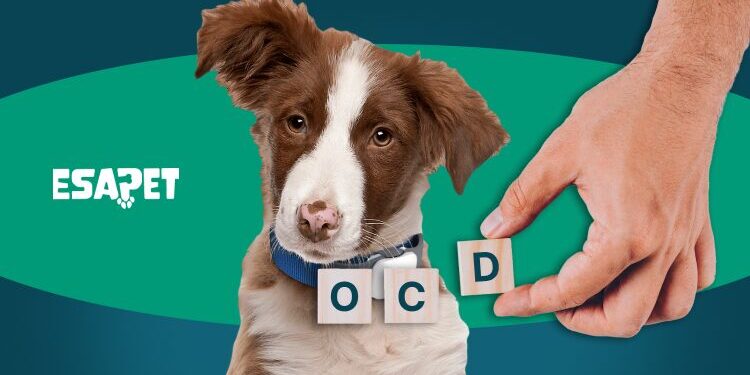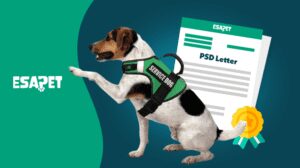Psychiatric Service Dog for OCD: Is It a Good Treatment?

Service dogs are animals trained to assist individuals with disabilities by performing tasks. For those with mental health conditions like Obsessive-Compulsive Disorder (OCD), these canine companions can provide critical support. They significantly enhance daily living.
An OCD service dog is more than just a pet. They are a dedicated partner in managing the symptoms of OCD. Through their specific training, these dogs help their handlers regain control. They help them improve their quality of life.
The presence of an OCD service dog offers both practical assistance and emotional comfort. It promotes a sense of security and well-being. These incredible companions have the power to transform lives. This post will explore all about PSDs for OCD.
What is Obsessive-Compulsive Disorder (OCD)?
Obsessive-Compulsive Disorder (OCD) is a mental health disorder. It is characterized by persistent, unwanted thoughts (obsessions) and repetitive behaviors (compulsions). These obsessions and compulsions can be distressing and disrupt daily life.
For example, a person with OCD might worry about germs and feel compelled to wash their hands. This mental illness often requires professional treatment. The treatment helps individuals manage their symptoms effectively.
What is a Psychiatric Service Dog (PSD)? How Can They Help with OCD?
A service dog refers to a specially trained service animal. It performs tasks to aid individuals with disabilities. These tasks can vary depending on the needs of the owner. The key aspect of a service dog is its specific training to support its owner’s independence and safety.
A psychiatric service dog is a specific type of service animal. A PSD is individually trained to assist individuals with mental health disorders. A Psychiatric service animal helps with disorders including:
- Bipolar Disorder
- PTSD
- Depression
- OCD
These dogs perform tasks that mitigate their handler’s psychiatric symptoms. For instance, psychiatric service dog training allows them to:
- Interrupt self-harm behaviors
- Provide deep pressure therapy during an anxiety attack
- Remind their handler to take medication
How Can a Psychiatric Service Dogs Help with OCD
For individuals struggling with Obsessive-Compulsive Disorder (OCD), daily life can be overwhelming. Symptoms such as intrusive thoughts and repetitive behaviors can impact one’s ability to function.
A psychiatric service dog (PSD) can provide critical support. It helps to manage these symptoms and improve the overall quality of life.
Benefits of Service Dogs
- Immediate Assistance: These animals can detect and respond to the onset of psychiatric episodes. They provide immediate help, such as applying DPT or retrieving medication, which can be life-changing.
- Practical Support in Daily Life: These service animals create a buffer in crowded areas, reducing stress and anxiety. They assist with tasks like opening doors and reminding their handlers to take medication. This helps in promoting greater independence.
- Therapeutic Relationship: The bond between a PSD and its handler offers consistent emotional support. This relationship enhances emotional well-being, contributing to long-term mental health benefits.
Emotional Support Animals Role
An emotional support animal provides comfort and companionship for individuals managing mental challenges. Unlike service animals, an emotional support dog does not require training to perform tasks.
Their primary role is to offer emotional support through their presence, and the owner can prove it with an ESA letter. This presence can help ease symptoms of anxiety, depression, OCD, and other mental health issues.
The bond between an ESA and its owner can be profoundly therapeutic. It offers a sense of stability and unconditional love.
For a detailed comparison of ESA and SAs, visit Emotional Support Animal Vs Service Animals.
Benefits of Assistance Animals for OCD
Psychiatric service dogs offer a range of mental health benefits. These can significantly improve the quality of life for individuals living with OCD. Below are some of the key mental health benefits these specially-trained dogs offer:
Emotional Regulation and Grounding
A service dog can help someone with OCD feel calmer and more grounded. These dogs are trained to respond to their owner’s emotions.
They can provide comfort and reassurance when the person is feeling upset. The strong bond between the person and their service dog can make them feel less lonely and help them stay emotionally stable.
Interruption of Compulsions
A big benefit of OCD service dogs is that they can interrupt compulsive behaviors. If someone with OCD starts doing repetitive actions, the dog can gently nudge or paw at them to get their attention.
This helps the person stop the compulsive behavior and focus on something else. It allows them to regain control and do more positive activities.
Increased Mindfulness and Presence
Having a service animal gives someone with OCD a daily routine. Things like feeding, walking, and playing with the dog help the person stay focused.
This can make them more mindful and grounded instead of getting caught up in their intrusive thoughts.
Anxiety Mitigation and Physiological Regulation
Many people with OCD also have a lot of anxiety. Service dogs are trained to provide deep pressure therapy (DPT).
They will lie across the person’s body when they are feeling anxious. This physical contact can help calm them down and make them feel more relaxed and in control of their body.
Increased Physical Activity and Well-Being
Taking care of a service dog involves regular exercise like walking and playing. This physical activity is good for both mental and physical disabilities.
It can release feel-good chemicals called endorphins. The endorphins help reduce OCD symptoms and improve overall well-being.
Task-Specific Assistance
OCD service dogs can be trained to perform specific tasks to help their owner. For example, they can retrieve medications, remind the person to take breaks or provide grounding support during panic attacks.
These specialized tasks can make a big difference in managing OCD-related challenges. It helps the person feel more independent.
Improved Social Engagement
Owning a service animal can lead to more social interactions. Walking a dog or visiting pet-friendly places allows one to connect with others. This can be very helpful for someone with OCD who may tend to isolate themselves.
For more information on the broader benefits of emotional support animals, visit our full guide on Emotional Support Animals.
What Can an OCD Service Dog Perform
OCD service dogs help people with Obsessive-Compulsive Disorder (OCD) manage their symptoms. Here are some of the important things these dogs can do:
Stop Compulsive Behaviors
If a person with OCD starts doing repetitive actions, the service dog can gently nudge or paw at them. This helps the person stop the compulsive behavior and focus on something else.
Provide Calming Comfort
When a person feels very anxious or has a difficult episode, the service dog can lie across their body. This deep pressure therapy can help calm the person down and make them feel more in control.
Warn About Oncoming Episodes
These dogs can notice the early signs that their owner is about to have an episode or anxiety attack. The dog can then alert the person so they can take steps to manage the situation before it gets worse.
Retrieve Important Items
If a person with OCD needs medication, the service dog can be trained to go get those items for their owner.
Guide to Safe Spaces
If someone with OCD becomes confused or disoriented during a difficult time, the service dog can lead them to a safe place.
Create a Calming Bubble
In crowded situations, the dog can create a personal space around their owner. This helps reduce anxiety and makes the person feel more secure.
By using these specialized skills, OCD service dogs can make a big difference. They help their owners manage their symptoms and improve their daily lives.
How to Train a Service Dog for OCD?
Training a service dog for OCD involves a detailed and rigorous process. This helps to ensure the dog can effectively assist its handler. The training generally follows two main components:
1. General Public Access Training
This step ensures that the service dog behaves appropriately in public settings. The dog learns basic commands and how to remain calm in various environments.
The General Public Access Test is often used to assess a dog’s ability to navigate public spaces without causing disruptions.
2. Specialized Task Training
After mastering public access skills, the dog undergoes specialized training. This training is tailored to the handler’s specific needs. This involves teaching the dog to perform tasks related to managing the OCD symptoms.
The dog can learn to interrupt compulsive behaviors or provide DPT during an anxiety attack. This specialized training ensures the dog can address its handler’s disability.
Do I Qualify for OCD Service Dogs?
Wondering how to get emotional support animal for your OCD needs? To qualify for an OCD service dog, individuals must meet certain criteria:
Diagnosis of a Mental Health Disorder
You must have a documented diagnosis of OCD or another mental health disorder. This diagnosis should come from a licensed mental health professional.
Need for Assistance
You need to demonstrate that a service dog is necessary to help you manage your OCD symptoms. This includes showing how the dog can perform tasks that mitigate your condition.
Commitment to Training
Owning a service dog requires a significant commitment to training and care. You must be willing to work with the dog and a professional trainer to ensure the dog can effectively perform its tasks.
How to Get a Psychiatric Service Dog for OCD
Getting psychiatric service dogs for OCD requires you to follow a structured process. To get a service dog for OCD, follow these steps:
1. Obtain a Diagnosis
Start by obtaining a diagnosis of OCD from a healthcare professional. This diagnosis is essential to qualify for a service dog.
2. Select a Suitable Dog
Choose a dog with a calm temperament and attentiveness to your needs.
3. Ensure Specialized Training
Ensure your animal undergoes training to assist with OCD symptoms. It includes teaching them tasks such as providing deep pressure stimulation and offering emotional support.
4. Get Your Legit PSD Letter in ESA Pet
Getting a PSD letter is a simple process. With ESA Pet, obtaining a legitimate PSD letter is easy and efficient:
- Start with a brief pre-screening to check your eligibility for a PSD letter. This questionnaire gathers information about your psychiatric condition.
- ESA Pet then connects you with a licensed professional for a detailed evaluation. During this telehealth session, you’ll discuss your mental health condition, its impact on your daily life, and how your service dog assists you.
- Once approved, you’ll receive your signed PSD letter on official letterhead. You will receive this letter digitally within three business days.
Get your Official PSD Letter Consultation from a licensed therapist.
Get PSD Letter Now
Best Dog Breeds for Obsessive-Compulsive Disorder
Here are some of the top dog breeds for individuals with OCD:
- Labrador Retriever: Renowned for their friendly nature and high trainability. Labradors are patient and eager to please. This makes them excellent service dogs for managing OCD symptoms.
- German Shepherd: German shepherds are highly intelligent and versatile. They are famous for their strong work ethic and ability to learn complex tasks, which makes them great for assisting with OCD.
- Cavalier King Charles Spaniel: Gentle and affectionate dogs. They provide companionship and emotional support, which is crucial for those with OCD.
- Standard Poodle: With their high intelligence and hypoallergenic coats, Standard Poodles are ideal for individuals with OCD. They are easy to train and can perform a variety of tasks.
- Boxer: Energetic and affectionate. They provide both active companionship and emotional support. This can be beneficial for managing OCD symptoms.
- Miniature Schnauzer: Intelligent and alert. They are great for providing support and performing tasks tailored to the handler’s needs.
- Havanese: Small but sturdy. Havanese dogs are affectionate and alert. This makes them suitable for those living in apartments or smaller homes.
- Doberman Pinscher: Loyal and protective. Dobermans can sense their owner’s emotional state and can perform a wide range of tasks.
- Border Collie: Known for their intelligence and agility. Border Collies can learn complex tasks and provide constant companionship. This helps manage OCD.
- Lhasa Apso: Famous for their alertness and ability to form strong bonds with their owners. They offer support and companionship.
FAQs about OCD PSDogs
Can OCD Qualify for a Service Animal?
Yes. Individuals with OCD can qualify for a PSD. They need a diagnosis and a recommendation from a licensed mental health professional. The dog must get training to perform tasks that help manage OCD symptoms.
Should Someone With OCD Get a Dog?
A dog can be highly beneficial for someone with OCD. It can provide emotional assistance and interrupt compulsive behaviors. However, it’s important to consider the commitment required to care for and train the dog.
How Do You Train an OCD Service Dog?
Training involves public access training for basic obedience and specialized task training to assist with OCD symptoms. Ongoing training ensures the dog maintains its skills.
What Is a Service Dog for Anxiety Called?
A service dog for anxiety is often called a psychiatric service dog (PSD). These dogs are trained to perform tasks that help mitigate symptoms of anxiety and other mental health disorders.
Conclusion
OCD service dogs are invaluable for individuals with Obsessive-Compulsive Disorder (OCD). These trained animals help manage symptoms, interrupt compulsive behaviors, and provide DPT. Their presence significantly enhances the quality of life for their handlers.
The bond between an OCD service dog and its handler is unique and profound. Recognizing the transformative power of an OCD service dog changes the perspective. It highlights them as loyal companions capable of making a difference in managing OCD.











